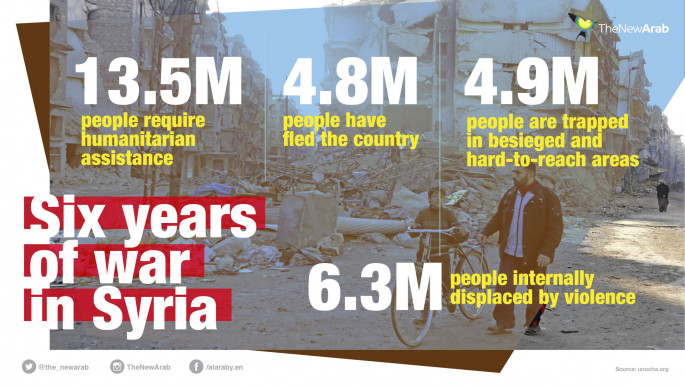
Assad adopts Trump's 'fake-news' defence to dismiss war-crimes accusations
In one episode of cherished British comedy show The Blackadder, Baldrick, a man "less intelligent than a turnip" ingeniously played by Sir Tony Robinson, is instructed by the eponymous lead Blackadder (Rowan Atkinson) to "deny everything" while standing as a witness in the latter's trial.
The crime was eating a military homing pigeon for tea.
Baldrick hilariously literally denies everything while being questioned by the judge, including his own identity.
Watching Bashar al-Assad's interviews one can't but help notice the similarities, albeit the effect is shock and outrage rather than amusement.
Like Baldrick, Assad literally denies everything thrown at him, insulting both his, the interviewer's, the audience's and most importantly, his people's intelligence.
In an infamous interview with the BBC two years ago exactly today, Assad denied the existence of the notorious but well-documented barrel bombs with his signature facetious laugh.
"I know about the army. They use bullets, missiles and bombs. I haven't heard of the army using barrels, or maybe, cooking pots," he said at the time.
Jeremy Bowen, the interviewer, later wrote: "It was a flippant response; the mention of cooking pots was either callousness, an awkward attempt at humour, or a sign that ...Assad has become so disconnected from what is happening that he feels overwhelmed."
 |
"We are living in a fake news era" --Bashar al-Assad, Syria's dictator |
 |
Going the Con-way
In a recent interview with Yahoo News, Assad did not deviate from that script, dismissing well-substantiated reports of the targeting of hospitals by his and Russian forces raised by the interviewer, veteran American journalist Michael Isikoff.
 |
| [Click to enlarge] |
But when Isikoff confronted Assad on the reported mass summary executions at the notorious Sadnaya prison, documented by Amnesty International, the Syrian dictator not only flat-out denied them, he also threw the term 'fake news' at him.
“You can forge anything these days,” Assad said when asked about the Amnesty International report estimating that between 5,000 and 13,000 prisoners were killed in a “calculated campaign of extrajudicial execution” at the military prison outside of Damascus between 2011 and December 2015. “We are living in a fake news era.”
Bashar al-Assad was not just cynically capitalising on Donald Trump's tactic of denying estabished facts that inconvience him by calling them 'fake news', in an allusion to the widespread fabrication of information by dubious media outlets including those that supported and propelled him. He was also using a deflection technique his own regime has long mastered, well before Kellyanne Conway (Trump's Bouthaina Shaaban?) and her alternative facts.
Indeed, when Isikoff pressed him on the Cesar affair, which saw thousands of pictures smuggled from Syrian prisons showing the bodies of detainees who died under torture, Assad suggested the pictures could have been 'photoshopped' or, echoing a claim long peddled by regime supporters, hinted that they could have been staged by Qatar, a country that backs the rebels.
Isikoff said the pictures had been authenticated by the FBI crime lab, to which Assad replied: "that means nothing".
Worth mentioning that in the same interview, Assad suggested there were many terrorists hiding among Syrian refugees, reinforcing the case of Islamophobic far-right groups in Europe, and the claims of Donald Trump himself.
Karim Traboulsi is an editor, writer and translator for The New Arab. Join the conversation on Twitter @kareemios





 Follow the Middle East's top stories in English at The New Arab on Google News
Follow the Middle East's top stories in English at The New Arab on Google News


